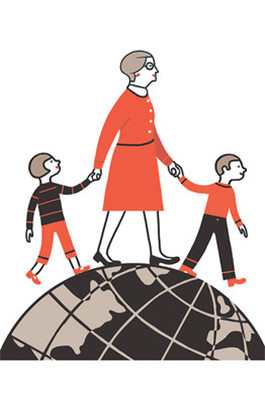(单词翻译:单击)
Why do I exist? This isn't a philosophical cri de coeur; it's an evolutionary conundrum. At 58, I'm well past menopause, and yet I'll soldier, on, with luck, for many years more. The conundrum is more vivid when you realize that human beings (and killer whales) are the only species where females outlive their fertility. Our closest primate relatives--chimpanzees, for example--usually die before their 50s, when they are still fertile.
我为什么存在?这不是一句哲学的呐喊,而是一个进化方面的谜题。58岁的我早已过了更年期,但如果幸运的话,我还会再活很多年。当你认识到人类(以及虎鲸)是雌性在生育期过后继续存活的唯一物种之后,这个谜题就显得更加突出了。与我们血缘最近的灵长类亲戚――比如黑猩猩――一般在还有生育能力的50多岁之前就死去了。
This isn't just a miracle of modern medicine. Our human life expectancy is much longer than it used to be--but that's because far fewer children die in infancy. Anthropologists have looked at life spans in hunter-gatherer and forager societies, which are like the societies we evolved in. If you make it past childhood, you have a good chance of making it into your 60s or 70s.
这不只是现代医学创造的奇迹。我们人类的平均寿命比过去长了很多――但这是因为早夭的儿童大大减少。人类学家考察过狩猎采集社会的人类寿命。这些社会跟我们最终进化形成的各种社会有相似之处。如果活到童年过后,那么你就很有可能能够活到60多岁或70多岁。

It turns out that my existence may actually be the key to human nature. This isn't a megalomaniacal boast but a new biological theory: the 'grandmother hypothesis.' Twenty years ago, the anthropologist Kristen Hawkes at the University of Utah went to study the Hadza, a forager group in Africa, thinking that she would uncover the origins of hunting. But then she noticed the many wiry old women who dug roots and cooked dinners and took care of babies (much like me, though my root-digging skills are restricted to dividing the irises). It turned out that these old women played an important role in providing nutrition for the group, as much as the strapping young hunters. What's more, those old women provided an absolutely crucial resource by taking care of their grandchildren.
原来,我的存在实际上可能是人类本性的关键。这不是狂妄自大的吹牛,而是一套新的生物学理论:“祖母假说”(grandmother hypothesis)。20年前,犹他大学(University of Utah)的人类学家克里斯滕・霍克斯(Kristen Hawkes)去非洲研究狩猎采集族群“哈扎”(Hadza),以为她会揭开狩猎的起源。但去了之后她注意到很多身材精瘦的老妇人负责挖植物的根、做饭、照顾孩子(跟我很像,不过我挖植物根的技能仅限于掰鸢尾根)。原来这些老婆婆对于为集体提供营养发挥着重要的作用,不亚于那些年轻强壮的狩猎者。另外,老婆婆们照管孙辈,提供了一种绝对重要的资源。
There are many controversies about what happened in human evolution. But there's no debate that there were two dramatic changes in what biologists call our 'life-history': Besides living much longer than our primate relatives, our babies depend on adults for much longer.
有关人类进化史上发生过哪些事情的争议有很多,但没有争议的是,生物学家所说的“生命史”上曾经有过两次重大变化:除了寿命在灵长类亲戚基础上大大延长以外,人类婴儿依赖成年人的时间也大大延长了。
Young chimps gather as much food as they eat by the time they are 7 or so. But even in forager societies, human children pull their weight only when they are teenagers. Why would our babies be helpless for so long? That long immaturity helps make us so smart: It gives us a long protected time to grow large brains and to use those brains to learn about the world we live in. Human beings can learn to adapt to an exceptionally wide variety of environments, and those skills of learning and culture develop in the early years of life.
幼年黑猩猩到七岁左右时采集的食物已经足够自己吃,人类儿童即便是在狩猎采集社会中,也要到十几岁的时候才能自给自足。我们的孩子为什么这么长的时间无法自立?这一漫长的未成熟期帮助我们变成了如今这般的聪明,因为它给我们很长的受保护的时间来长成硕大的大脑,并用这些大脑去了解周围的世界。人类可以学会适应各种各样的环境,而这些学习以及文化技能是在生命的早年形成的。
But that immaturity has a cost. It means that biological mothers can't keep babies going all by themselves: They need help. In forager societies grandmothers provide a substantial amount of child care as well as nutrition. Barry Hewlett at Washington State University and his colleagues found, much to their surprise, that grandmothers even shared breast-feeding with mothers. Some grandmoms just served as big pacifiers, but some, even after menopause, could 'relactate,' actually producing milk. (Though I think I'll stick to the high-tech, 21st-century version of helping to feed my 5-month-old granddaughter with electric pumps, freezers and bottles.)
但这种不成熟有其代价。它意味着生物学意义上的母亲无法完全靠自己带孩子:她们需要帮手。在狩猎采集社会,祖母不仅提供营养,也做了大量的育儿工作。华盛顿州立大学(Washington State University)的巴利・休利特(Barry Hewlett)及其同事非常意外地发现,祖母甚至和母亲共同哺乳。一些祖母仅仅是充当大奶嘴的作用,但有些祖母甚至在更年期过后都能“重新哺乳”(relactate),真的会分泌乳汁。(不过我想我自己会坚持采用21世纪的高科技方法,用电泵、冰箱和奶瓶来帮助喂养五个月大的孙女。)
Dr. Hawkes's 'grandmother hypothesis' proposes that grandmotherhood developed in tandem with our long childhood. In fact, she argues that the evolution of grandmothers was exactly what allowed our long childhood, and the learning and culture that go with it, to emerge. In mathematical models, you can see what happens if, at first, just a few women live past menopause and use that time to support their grandchildren (who, of course, share their genes). The 'grandmother trait' can rapidly take hold and spread. And the more grandmothers contribute, the longer the period of immaturity can be.
霍克斯博士的“祖母假说”提出,祖母现象是跟我们的漫长幼年期是一起形成的。她认为,事实上正是祖母的进化使得我们的漫长幼年期以及与之伴随的学习与文化得以出现。在数学模型中,你可以看到,如果最开始只有几个妇女活过更年期,用这些时间来抚养孙辈(孙辈当然也带有她们的基因),那么会出现什么情况。“祖母遗传特性”可以迅速形成并扩散。祖母贡献越大,未成熟期可能就越长。
So on Mother's Day this Sunday, as we toast mothers over innumerable Bloody Marys and Eggs Benedicts across the country, we might add an additional toast for the gray-haired grandmoms behind the scenes.
所以在这个周日的母亲节,在全国各地人们用无数的血腥玛丽和班尼迪克蛋向母亲们表达祝福之际,我们不妨也向默默奉献的银发祖母们致以敬意。


